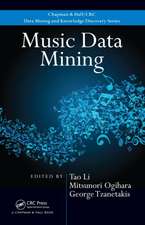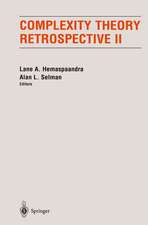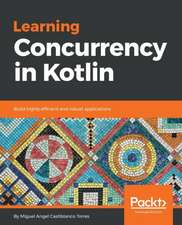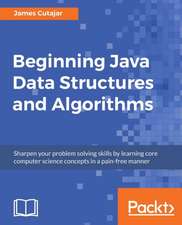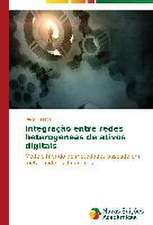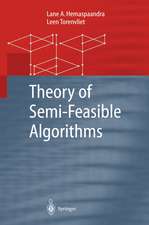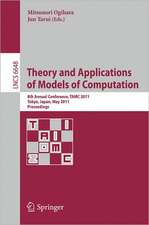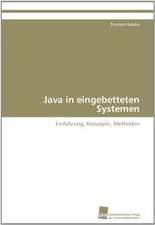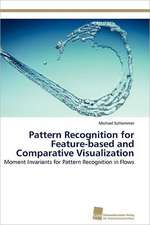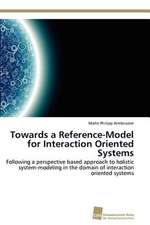The Complexity Theory Companion: Texts in Theoretical Computer Science. An EATCS Series
Autor Lane A. Hemaspaandra, Mitsunori Ogiharaen Limba Engleză Hardback – dec 2001
The book's thesis is that simple algorithms are at the heart of complexity theory. From the tree-pruning and interval-pruning algorithms that shape the first chapter to the query simulation procedures that dominate the last chapter, the central proof methods of the book are algorithmic. And to more clearly highlight the role of algorithmic techniques in complexity theory, the book is - unlike other texts on complexity - organized by technique rather than by topic. Each chapter of this book focuses on one technique: what it is, and what results and applications it yields.
This textbook was developed at the University of Rochester in courses given to graduate students and advanced undergraduates. Researchers also will find this book a valuable source of reference due to the comprehensive bibliography of close to five hundred entries, the thirty-five page subject index, and the appendices giving overviews of complexity classes and reductions.
| Toate formatele și edițiile | Preț | Express |
|---|---|---|
| Paperback (1) | 393.77 lei 6-8 săpt. | |
| Springer Berlin, Heidelberg – 15 dec 2010 | 393.77 lei 6-8 săpt. | |
| Hardback (1) | 542.18 lei 6-8 săpt. | |
| Springer Berlin, Heidelberg – dec 2001 | 542.18 lei 6-8 săpt. |
Din seria Texts in Theoretical Computer Science. An EATCS Series
- 20%
 Preț: 319.35 lei
Preț: 319.35 lei - 20%
 Preț: 341.30 lei
Preț: 341.30 lei - 20%
 Preț: 199.04 lei
Preț: 199.04 lei - 20%
 Preț: 430.64 lei
Preț: 430.64 lei -
 Preț: 383.93 lei
Preț: 383.93 lei - 20%
 Preț: 345.26 lei
Preț: 345.26 lei - 20%
 Preț: 599.76 lei
Preț: 599.76 lei - 20%
 Preț: 332.06 lei
Preț: 332.06 lei -
 Preț: 465.70 lei
Preț: 465.70 lei - 20%
 Preț: 727.14 lei
Preț: 727.14 lei - 15%
 Preț: 591.28 lei
Preț: 591.28 lei -
 Preț: 399.50 lei
Preț: 399.50 lei - 20%
 Preț: 362.57 lei
Preț: 362.57 lei - 20%
 Preț: 332.06 lei
Preț: 332.06 lei - 20%
 Preț: 999.85 lei
Preț: 999.85 lei - 20%
 Preț: 601.92 lei
Preț: 601.92 lei - 20%
 Preț: 341.63 lei
Preț: 341.63 lei - 20%
 Preț: 354.71 lei
Preț: 354.71 lei - 20%
 Preț: 644.95 lei
Preț: 644.95 lei - 20%
 Preț: 655.83 lei
Preț: 655.83 lei -
 Preț: 394.29 lei
Preț: 394.29 lei - 20%
 Preț: 339.14 lei
Preț: 339.14 lei - 15%
 Preț: 712.54 lei
Preț: 712.54 lei - 20%
 Preț: 588.86 lei
Preț: 588.86 lei - 20%
 Preț: 722.66 lei
Preț: 722.66 lei - 20%
 Preț: 611.15 lei
Preț: 611.15 lei - 20%
 Preț: 421.47 lei
Preț: 421.47 lei - 20%
 Preț: 520.17 lei
Preț: 520.17 lei - 20%
 Preț: 502.83 lei
Preț: 502.83 lei -
 Preț: 387.96 lei
Preț: 387.96 lei - 20%
 Preț: 336.35 lei
Preț: 336.35 lei - 20%
 Preț: 342.28 lei
Preț: 342.28 lei
Preț: 542.18 lei
Preț vechi: 677.72 lei
-20% Nou
Puncte Express: 813
Preț estimativ în valută:
103.76€ • 112.67$ • 87.16£
103.76€ • 112.67$ • 87.16£
Carte tipărită la comandă
Livrare economică 22 aprilie-06 mai
Preluare comenzi: 021 569.72.76
Specificații
ISBN-13: 9783540674191
ISBN-10: 3540674195
Pagini: 388
Ilustrații: XIII, 372 p.
Dimensiuni: 155 x 235 x 26 mm
Greutate: 0.71 kg
Ediția:2002
Editura: Springer Berlin, Heidelberg
Colecția Springer
Seria Texts in Theoretical Computer Science. An EATCS Series
Locul publicării:Berlin, Heidelberg, Germany
ISBN-10: 3540674195
Pagini: 388
Ilustrații: XIII, 372 p.
Dimensiuni: 155 x 235 x 26 mm
Greutate: 0.71 kg
Ediția:2002
Editura: Springer Berlin, Heidelberg
Colecția Springer
Seria Texts in Theoretical Computer Science. An EATCS Series
Locul publicării:Berlin, Heidelberg, Germany
Public țintă
Professional/practitionerCuprins
1. The Self-Reducibility Technique.- 2. The One-Way Function Technique.- 3. The Tournament Divide and Conquer Technique.- 4. The Isolation Technique.- 5. The Witness Reduction Technique.- 6. The Polynomial Interpolation Technique.- 7. The Nonsolvable Group Technique.- 8. The Random Restriction Technique.- 9. The Polynomial Technique.- A. A Rogues’ Gallery of Complexity Classes.- B. A Rogues’ Gallery of Reductions.- References.
Recenzii
From the reviews of the first edition:
"The introduction … begins with two secrets: that algorithms are at the heart of complexity theory, and moreover that simple algorithms are at the heart of complexity theory. The main body of the book then proceeds to try and illustrate this view. … While all the chapters primarily deal with a succession of theorems, lemmas and proofs, the surrounding text makes it fairly accessible and readable. … The appendices are very well laid out and could probably replace a small library of textbooks." (A. Weaver, Journal of the Operational Research Society, Vol. 54, 2004)
"The book is intended for readers who seek an accessible, algorithmically oriented research-centered, up-to-date guide to several interesting techniques of computational complexity. In contrast to the organization of other books, each chapter of this book focuses on one particular technique in complexity theory. … The book contains two appendices, the first presenting a concise overview on complexity classes, the second one on reductions. The book presents a survey on a great variety of recent interesting techniques in complexity." (Ludwig Staiger, Zentralblatt MATH, Vol. 993, 2002)
"The introduction … begins with two secrets: that algorithms are at the heart of complexity theory, and moreover that simple algorithms are at the heart of complexity theory. The main body of the book then proceeds to try and illustrate this view. … While all the chapters primarily deal with a succession of theorems, lemmas and proofs, the surrounding text makes it fairly accessible and readable. … The appendices are very well laid out and could probably replace a small library of textbooks." (A. Weaver, Journal of the Operational Research Society, Vol. 54, 2004)
"The book is intended for readers who seek an accessible, algorithmically oriented research-centered, up-to-date guide to several interesting techniques of computational complexity. In contrast to the organization of other books, each chapter of this book focuses on one particular technique in complexity theory. … The book contains two appendices, the first presenting a concise overview on complexity classes, the second one on reductions. The book presents a survey on a great variety of recent interesting techniques in complexity." (Ludwig Staiger, Zentralblatt MATH, Vol. 993, 2002)
Textul de pe ultima copertă
The Complexity Theory Companion is an accessible, algorithmically oriented, research-centered, up-to-date guide to some of the most interesting techniques of complexity theory.
The book's thesis is that simple algorithms are at the heart of complexity theory. From the tree-pruning and interval-pruning algorithms that shape the first chapter to the query simulation procedures that dominate the last chapter, the central proof methods of the book are algorithmic. And to more clearly highlight the role of algorithmic techniques in complexity theory, the book is - unlike other texts on complexity - organized by technique rather than by topic. Each chapter of this book focuses on one technique: what it is, and what results and applications it yields.
This textbook was developed at the University of Rochester in courses given to graduate students and advanced undergraduates. Researchers also will find this book a valuable source of reference due to the comprehensive bibliography of close to five hundred entries, the thirty-five page subject index, and the appendices giving overviews of complexity classes and reductions.
The book's thesis is that simple algorithms are at the heart of complexity theory. From the tree-pruning and interval-pruning algorithms that shape the first chapter to the query simulation procedures that dominate the last chapter, the central proof methods of the book are algorithmic. And to more clearly highlight the role of algorithmic techniques in complexity theory, the book is - unlike other texts on complexity - organized by technique rather than by topic. Each chapter of this book focuses on one technique: what it is, and what results and applications it yields.
This textbook was developed at the University of Rochester in courses given to graduate students and advanced undergraduates. Researchers also will find this book a valuable source of reference due to the comprehensive bibliography of close to five hundred entries, the thirty-five page subject index, and the appendices giving overviews of complexity classes and reductions.
Caracteristici
Offers an algorithmic approach to computational complexity Intuitive approach makes this field more easily and fully accessible to readers at all levels Includes supplementary material: sn.pub/extras


